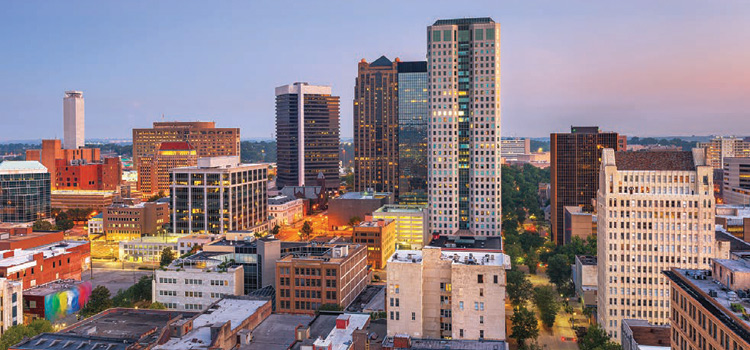As with all parts of the U.S., the Southeast Region was hit hard by the COVID-19 pandemic, producing double-digit unemployment rates and deep declines in economic output by midyear 2020. By the third quarter of last year, however, these states (Alabama, Arkansas, Georgia, Kentucky, Louisiana, Mississippi and Tennessee) were rebounding.
Quarterly gross domestic product (GDP) growth in Q3 2020 ranged from 31.8% in Arkansas to 46.5% in Tennessee — largely a reflection of massive GDP decreases in the prior quarter. As of December 2020, unemployment rates in these states were declining but were generally higher than their pre-pandemic levels in March of last year.
Attracted by lower taxes and labor costs, much of the U.S. manufacturing base has moved to this region. The Southeast has become a center for manufacturing cars, airplanes and ships. Despite attracting various industries and many Fortune 500 companies, these states suffer from income inequality and poverty. As of 2019, Mississippi ranked last among all states in per capita income at $38,914, while Kentucky, Alabama and Arkansas also ranked among the bottom five.

Georgia is a hub for the logistics and distribution industry. In 2019, Hartsfield-Jackson Atlanta International Airport was the busiest airport in the world with 110.5 million passengers. Delta Air Lines and United Parcel Services are two global transportation companies based in the state.
With more than 780 biosciences companies, Alabama has become an important center in the global fight against diseases. Birmingham- based Southern Research, for example, has created several federally approved drugs used in cancer treatments, and has made important advances in the treatment of HIV/AIDS, polio and mosquito-borne diseases.
Arkansas has important companies for the timber, paper products and metals industries. It also is home to Bentonville-based Walmart, the No. 1 company on the 2020 Fortune 500 list. Tennessee and Kentucky each have significant chemical-manufacturing industries, which employ roughly 16,700 workers in Tennessee and 15,000 in Kentucky.
Louisiana has the highest number of oil refineries per capita in the U.S. and is the third-largest consumer of petroleum. Commercial fishing also is a key industry for the state. Mississippi, meanwhile is a center for shipbuilding. VT Halter Marine is the largest designer and builder of medium-sized vessels in the world, while roughly 70% of the U.S. Navy’s fleet of warships were manufactured by Huntington Ingalls in Pascagoula, Mississippi. ●

Asking rents, however, continued to rise. In fourth-quarter 2020, the average asking rent was $30.34 per square foot, up from $28.19 in fourth-quarter 2019.
Cushman & Wakefield reported that office tenants in the Tennessee capital have been evaluating their space needs. Overall leasing activity in 2020 was down 24% compared to 2019, largely due to the uncertainty created by the pandemic.
Cushman & Wakefield noted, however, that several large companies signed leases last year of at least 40,000 square feet. These tenants included footwear retailer Genesco, Blue Cross Blue Shield, HCA Healthcare, iHeartMedia and FirstBank.
Focus: Auto manufacturing
The Southeast is a major production center for the U.S. automobile industry. In Tennessee, the auto industry employs 123,000. Nissan’s North American headquarters is in Franklin, outside of Nashville, and the company has a plant in nearby Smyrna. General Motors and Volkswagen have Tennessee-based operations in Spring Hill and Chattanooga, respectively.
Kentucky, meanwhile, is the No. 1 per capita producer of cars, light trucks and SUVs. Some 520 auto-related companies employ more than 100,000 people in the Bluegrass State. In Mississippi, more than 200 auto-related manufacturers employ more than 20,000 workers.
General Motors, Kia Corp. and Mercedes-Benz make vehicles in Georgia. In Alabama, automakers combined to produce about 1 million cars and light trucks in 2019. Toyota, Honda and Hyundai produced nearly 1.5 million engines in Alabama that year.
What the locals say
“We’ve certainly had a great economy as it relates to entertainment and health care for a long time, but we’ve seen growth from companies of all kinds because of our tax structure and business incentives, tech in particular. Amazon has one of their largest hubs here. We have financial-sector companies like Alliance Bernstein. We have accounting firms like Ernst & Young. … When you combine our favorable tax structure with our geographic advantage of being one of the few cities that has three major highways intersecting it, the people who have to distribute things know they can touch over half the population of the United States within a day’s drive of Nashville.”
Jeff Checko
Relocation director, Re/Max Advantage
3 Cities to Watch
Atlanta

Lexington

Birmingham

Sources: Alabama Department of Commerce; Arkansas Economic Development Commission; Atlanta-Journal Constitution; Britannica.com; City of Atlanta; CNN; Cushman & Wakefield; Encyclopedia.com; Forbes; Georgia Department of Economic Development; Institute for Energy Research; Kentucky Cabinet for Economic Development; Mississippi Development Authority; Southern Research; Tennessee Department of Economic & Community Development; Trading Economics; U.S. Bureau of Economic Analysis; U.S. Bureau of Labor Statistics; U.S. Census Bureau






